With you, we make a difference


With you, we make a difference


The end of year is time to reflect and celebrate. Despite ongoing challenges associated with the evolving pandemic, our vision of happy, healthy kids and our commitment to improving the lives of children and young people everywhere has never been stronger.
We pursue this core mission not only through excellence in research but seeking to translate the knowledge generated by our research into new treatments, interventions, and changes to policy and practice.
The Telethon Kids Institute has a long and successful history of advocacy, stretching back to its earliest days when Institute Founder, now Patron, Professor Fiona Stanley and Professor Carol Bower confirmed the vital role of maternal dietary folate in reducing the risk of neural tube defects.
Not content to simply make this important finding, Professors Stanley and Bower followed up their research with two decades of patient and persistent advocacy to ensure it was put to use. Their determined efforts contributed in 2009 to the national mandatory fortification of wheat flour in bread making – a move which increased folate levels and reduced the rates of neural tube defects in the WA population by 15 per cent. The change particularly benefited the Aboriginal population, which in the five years following fortification saw a dramatic 68 per cent drop in serious birth defects.
This kind of tightly targeted and effective advocacy is an important mechanism to ensure that our research has greater impact.
Over the years we have been a passionate voice in campaigning for improved health and wellbeing of children and families, applying our advocacy to a broad range of significant public issues including paid parental leave, increased standards for childcare, compulsory pool fencing, mandatory reporting of abuse, mandatory alcohol label warnings, junk food advertising, the impact of climate change on children’s health and wellbeing and, since 2020, COVID-19.
Most recently, as you may have seen in the media, we have used our voice to advocate in the area of youth justice – specifically regarding the management and treatment of young people at the Banksia Hill Detention Centre and the decision to move some children from Banksia Hill to the adult prison at Casuarina.
Our ongoing advocacy on this important social justice issue has been very much centred around ground-breaking research led by Professor Carol Bower which, in 2018, uncovered unprecedented levels of severe neurodisability among young people detained at Banksia Hill.
The Banksia Hill Project was the first study in Australia to assess and diagnose young people in a youth custodial setting for Fetal Alcohol Spectrum Disorder (FASD). The Telethon Kids Institute assessment team was made up of health professionals including a paediatrician, occupational therapist, speech pathologist, and a neuropsychology team, who worked with more than 100 young people aged 10-17, during 2015 and 2016. The team found 36 per cent of the young people assessed had FASD and 89 per cent had at least one form of severe neurodevelopmental impairment – most of which had gone previously undiagnosed. As part of their findings, they recommended policy changes which recognise and respond to the vulnerability of young people within the justice system.
The Institute has continued to advocate for these and other changes and we continue to work with the Government to use our evidence to influence and inform their decisions on this difficult issue.
As Western Australia’s only child health medical research institute, it is important that we use our evidence and expertise to facilitate change –even when topics are sensitive, and discussions may be fraught.
I am very proud of what we have achieved in an extraordinary year for the Institute. We continue to ask the difficult questions, push the boundaries on innovative discoveries and advocate for policy changes based on evidence.
The health and happiness of children everywhere remains at the heart of why we all come together and do what we do. All made possible by you – thank you to our generous supporters, donors and funders who walk this path with us.
 Professor Jonathan
Professor Jonathan
Carapetis
AM Executive DirectorTo read more about the research and programs produced as part of the Banksia Hill Project, scan the QR code.


With COVID-19 restrictions lifted in the last year, Telethon Kids Institute has once again been able to expand our horizons and collaborate in person around the globe. We’ve launched three new sites – in Joondalup, Cockburn and South Australia – and our researchers have visited countries including Sweden, Africa and the United States.
The new Telethon Kids office in Joondalup opened in October, with two teams utilising the site - CliniKids and ORIGINS. The space has been designed to accommodate families with young children, children on the autism spectrum, and children with developmental delays. The office includes 11 clinical spaces, blood and lab rooms, a parent’s Lounge, family rooms, and convenient parking.
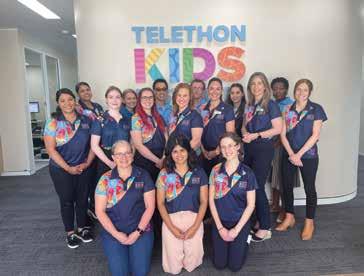
In mid-2022, researchers from our ear health team moved into new offices in the Cockburn Integrated Health centre. Next year, we look forward to expanding our services in Cockburn through the launch of the Djaalinj Waakinj (listening talking) Centre for Ear and Hearing Health. Due to open in March, the new service has been driven by the needs of the community and has been made possible due to long-standing collaborations with local Aboriginal health organisations and Ear, Nose and Throat specialists. The service at Cockburn is dedicated to helping Aboriginal children and aims to treat around 400 families each year.

In April this year we officially opened our Adelaide Office, welcoming 30 staff and researchers. Located on Flinders Street, the office creates opportunities for Telethon Kids to collaborate with other health providers and research institutes. There are currently two teams working in the office – The Child Health, Development and Education team and Indigenous Genomics team.
Executive Director Jonathan Carapetis described the opening as an exciting new step for Telethon Kids to collaborate with great organisations in South Australia and respond to the needs of children and families.

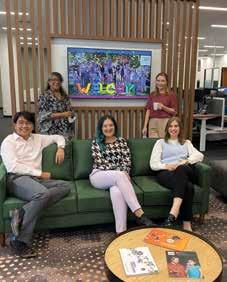
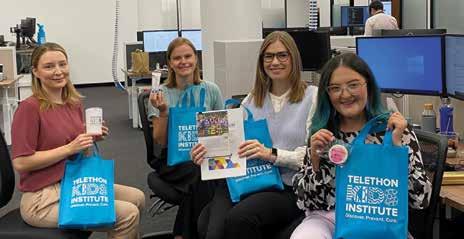
On the 24-27th August, our researcher, Dr Nicole Hill, attended the biennial European Symposium for Suicide and Suicide Behaviour in Copenhagen, Denmark. Nicole chaired and presented at a workshop on the detection of, response to, and prevention of suicide clusters.
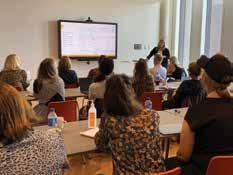
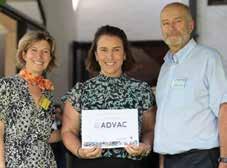
Dr Alma Fulurija, Project Lead for the WCVID Strep A Vaccine team, attended the 22nd Advanced Course of Vaccinology (ADVAC) held in Annecy, France. This highly regarded program provides the tools required for the translation of scientific and epidemiological evidence into effective policy development related to vaccines and immunisation.
Researchers from the END RHD Program, part of the Wesfarmers Centre of Vaccines and Infectious Diseases (WCVID), attended the Lancefield International Symposium on Streptococci and Streptococcal Disease in Stockholm, Sweden. Taking place in June, this was the first time WCVID researchers had been able to attend an international conference in person since the COVID-19 pandemic began and was a valuable opportunity to re-engage and solidify relationships with their global collaborators.
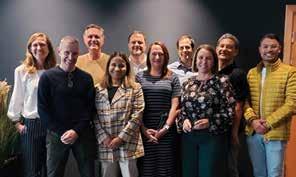
In August, Dr Vinutha Shetty, Rachel Lim and Professors Liz Davis and Tim Jones attended the Australiasian Diabetes Conference (ADC) in Brisbane to present on several research projects conducted at the Rio Tinto Children’s Diabetes Centre: A JDRF Global Centre of Excellence. Dr Shetty shared an update on the promising clinical outcomes and the positive patient experience using Act1ve, an exercise app developed by the diabetes team in partnership with young people. Dr Mary Abraham was also awarded the prestigious 2022 ADS Lindsey Baudinet Rising Star Award in type 1 diabetes research.
Associate Professor Hannah Moore, Co-Head of the Wesfarmers Centre of Vaccines and Infectious Diseases ID Epidemiology team, travelled to Brussels, Belgium in September after being invited to be the keynote speaker at the respiratory syncytial virus (RSV) meeting of a European consortium, PROMISE. Hannah spoke about how RSV affects kids ‘down under’, how COVID-19 has affected seasonal trends, and the importance of enhancing communication around upcoming prevention strategies.
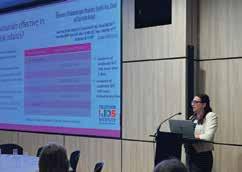
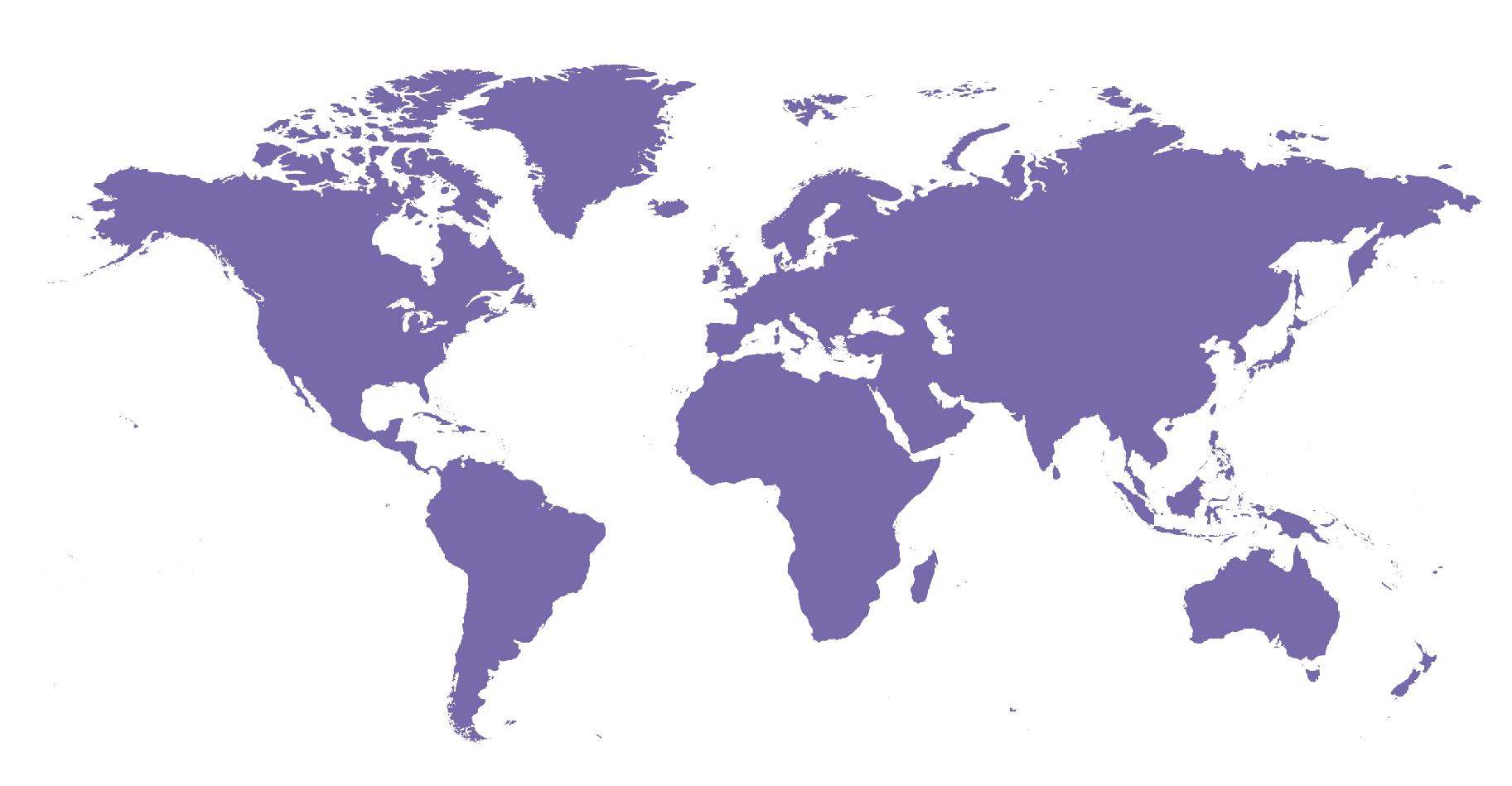
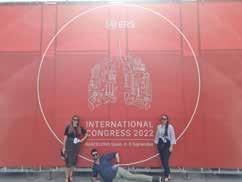
In September, a large group of Wal-yan Respiratory Research Centre researchers travelled to Spain to attend the annual European Respiratory Society (ERS) International Congress – the world's largest respiratory meeting. Tiffany Bradshaw, Denby Evans, Dr James Gibbons, Naomi Hemy, Dr Pam Laird, Dr Daniel Laucirica, Grace Pettigrew, Associate Professor Shannon Simpson, Dr Elizabeth Smith, Rebecca Watkinson, and Dr Adelaide Withers presented and discussed the most recent scientific and clinical developments in the field of respiratory medicine, along with other international professionals.
On the 28-29th November, CliniKids researchers headed to Geelong for the Australasian Society for Autism Research (ASfAR) conference to give an update on their paediatric autism research. The researchers included current ASfAR president, Professor Andrew Whitehouse, Dr Gail Alvares, Sarah Pillar, Dr Jess Reynolds, Dr Claire Shackleton, Briohny Dempsey, Georgina Earl, Claudia Ong, and Associate Professor David Trembath.
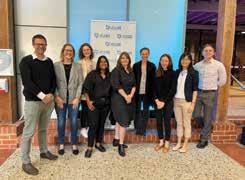

The Rio Tinto Children’s Diabetes Centre team including Helen Clapin and Dr Craig Taplin travelled to Christchurch, NZ to attend the Annual Scientific Meeting of the Australia and New Zealand Society for Paediatric Endocrinology and Diabetes (ANZSPED, formerly APEG) in November, to present on several recent research projects. Helen presented the findings of a national study on longterm glycaemic outcomes associated with diabetic ketoacidosis at onset of type 1 diabetes in children and young adults. Craig presented on promising real world glycaemic outcomes observed in WA youth with type 1 diabetes starting Control IQ hybrid closed loop technology.

In a world-first clinical trial at Telethon Kids Institute, pet dogs could unlock a new immunotherapy treatment for a common childhood cancer, Sarcoma.

Sarcoma – a cancer of the bones and soft tissue –is the third most frequent cancer in kids, taking the lives of one in three children affected by the disease. A new trial led by the head of the Telethon Kids Cancer Centre, Associate Professor Joost Lesterhuis, is using a polymer-based gel loaded with immunotherapy drugs, which is applied inside a surgical wound once the tumour has been removed. The gel essentially ‘mops up’ any remaining cancer cells left behind giving a higher chance of successfully removing all the tumour.
If effective, this gel could negate the need for toxic treatments like radiotherapy and chemotherapy— both can have devastating effects for kids that survive cancer.
Joost said the first step for almost all Sarcoma patients after diagnosis is surgery to remove the tumour.
“The surgeon will try to remove as much tissue as possible, but often some cancer cells are left behind and the cancer just comes back,” he said.
“With the immunotherapy gel, the surgeon would remove the tumour and apply the gel before closing the wound as they normally would. Then over time, the immunotherapy drugs get to work –drawing immune cells from all over the body and activating them at the site of the tumour to mop up any remaining cancer cells.”
So how do our beloved pooches help?
The disease also happens to be a common cancer for dogs and presents in exactly the same way as it does with children. The gel has shown positive results in lab models and is now being used at Perth Vet Specialists to treat pet dogs who have been diagnosed with sarcoma.
Veterinary oncologist, Dr Ken Wyatt, said so far seven dogs had been treated with the gel in surgery, with the results overwhelmingly paw-some.
“Everybody’s winning – the dogs are getting treatments they would otherwise not have access to and they’re also doing something that could ultimately help children with cancer,” Ken said.
Even though the last 30 years have seen incredible advancements in cancer treatment, Sarcoma has seen few developments - thus immunotherapy is an exciting chance to turn the tables on this cruel disease for kids and canines alike. Most importantly it could potentially replace chemotherapy and radiotherapy in the future, giving children the chance at living a happier, healthier life post treatment.
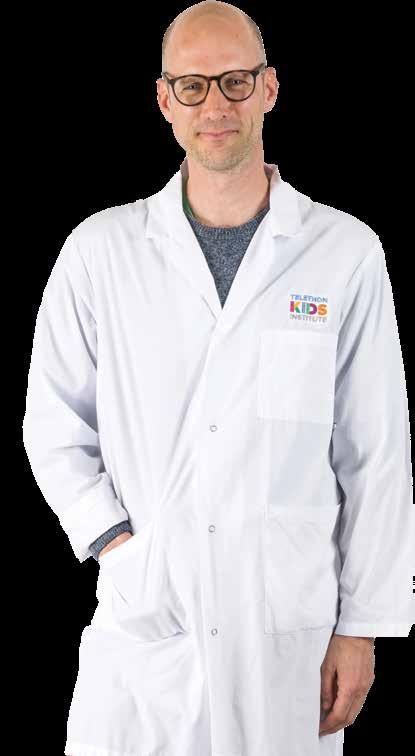
Chloe Clements knows all too well the need to find gentler treatments for cancer. Chloe was a competitive national gymnast and had a love of dancing.
All that changed on the 4th of August 2013, when Chloe was told she had a medulloblastoma brain tumour – one of the most aggressive forms of childhood cancer.
Although medical research has led to amazing discoveries to treat and survive cancer, the aggressive and toxic nature of treatments leaves kids with debilitating and life-long side effects.
Chloe is reminded every day of her cancer - her treatment damaged her hair follicles, so she wears a wig. Chemo destroyed her eggs so she can never have a child of her own. She’s had cataracts removed from her eyes, has poor balance, has suffered hearing loss, and has the bone density of a 70-year-old woman.
She lives with the constant threat of secondary cancers.
But right here in WA, there is real hope.
Telethon Kids Institute is working tirelessly to find effective and safer types of cancer treatment to alleviate life-long side effects that kids with cancer still face today.
Projects like Joost’s immunotherapy trial for Sarcoma could unlock the science to safer and gentler treatments for childhood cancer – allowing kids to not only beat cancer, but thrive afterwards.
Our researchers and clinicians know that kids with cancer deserve better, however we couldn’t do it without you.
This festive season we ask you to help us by digging deep so that researchers like Joost can discover breakthrough medical treatments.
Your support will allow us to give kids with cancer the bright future that they deserve. To give a gift today, please visit telethonkids.raisely.com
It’s my wish this festive season for gentler treatments to be available for all kids living with cancer. I am fortunate to be alive, but the lifelong side effects still significantly impact me every day.
On behalf of all families with a child who is living with cancer, has overcome cancer, or has sadly passed away: ask you to please dig deep.
Cancer can happen to any child and current treatments for kids’ cancer aren’t good enough! The only way things can improve is through research.
With thanks and hope

Always wearing a smile, Professor Ben Jackson is clearly passionate about his work at Telethon Kids.
As Theme Head for Brain and Behaviour, Ben is focused on creating collaboration, partnerships, new ideas and opportunities.
Inspired by his own family, Ben has always been interested in research and the impact it creates.
His older brother did his PhD on finding better ways to detect early warning signs of ovarian cancer. Ben readily admits that he wasn’t smart enough to understand all the technical elements, but he loved hearing about what his brother was doing and the community of people he was working with.
That’s what sparked Ben’s interest in health research.
He joined the Institute in 2021 and has a shared appointment between Telethon Kids Institute and The University of Western Australia.
Appointed Head of Brain and Behaviour in June 2021, Ben is passionate about the large scope of work and all the opportunities that come with it. Managing close to 300 staff and students across four research programs, housing 14 different research teams, means no two days ever look the same.
Brain and Behaviour largely focuses on non-laboratory work –working to improve mental health, disability services and support, lifestyle behaviours (e.g., physical activity, nutrition), and child development, as well as supporting families, schools, and communities.
Ben also undertakes his own research within the Psychology of Active, Healthy Living (PAHL) team which he established in 2012 and brought with him to Telethon Kids. Focused on topics like motivation, resilience, communication, teamwork, and confidence, the PAHL team develops programs and services that improve people’s mental and physical health, through the power of good social connections.

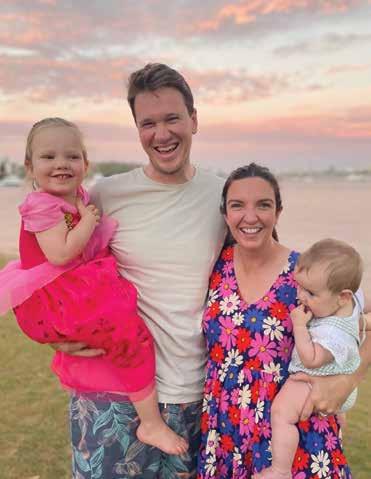
Brothers Luke, Dylan and James McPherson recently raised over $2300 for the Telethon Kids Institute while preparing for the Ironman 70.3 WA triathlon in early December.
After “roping in” his brothers to participate as a team, Luke said he wanted the funds raised to go towards youth suicide prevention research.
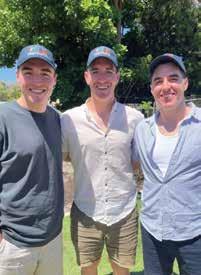
Having battled anxiety, depression, and OCD, then losing his cousin Sam in July 2017 to suicide, Luke and his family have continued to build awareness and raise funds for research to help reduce the number of lives lost.
“Through our community health initiatives and partner programs, we try to help people manage their weight, improve their mental health, make better dietary choices, be more physically active, and feel more resilient at school, work, and home,” Ben said.
“Above all else, we make sure we listen to community priorities and design programs that tackle the health challenges that really matter.”
Throughout his career, it’s people who have inspired Ben – his brother, his colleagues, mentors and now our community at Telethon Kids.
Away from the Institute, sporting interests keep him busy, but life for Ben revolves around his family.
“With two little girls, a full night’s sleep is a distant memory, but life’s full and fun, and my girls are a constant reminder to me of why the Institute’s work is so important.”
Read more about current Brain & Behaviour projects on pages 12 and 13.
“I am as happy and healthy as I have ever been and have been loving pounding the pavement for the event,” Luke said, adding that he plans to complete the event solo in 2023.
Telethon Kids Institute’s Dr Nicole Hill is a leading researcher into the detection, response and prevention of youth suicide.
Nicole said the funds raised by the McPherson siblings will directly support the research of her team.
“Luke’s tremendous effort to complete a half marathon and use the opportunity to raise funds for suicide prevention research is really valued by myself and my team,” Nicole said.
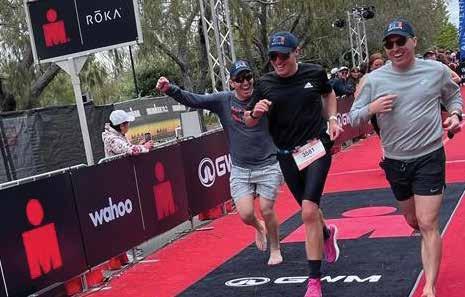
The Peel region in Western Australia has a youth suicide rate that is twice the national average.
Current services are limited, stretched and frequently unable to respond to the needs of young people experiencing a suicidal crisis, leading to further risk.
In an effort to tackle this alarming statistic, our trailblazing researchers have come up with an innovative alternative to the emergency department, known as the Youth Safe Haven Project.
Led by Dr Nicole Hill in partnership with mental health services in the Peel region and the Institute’s Embrace Co-Director, Professor Ashleigh Lin, the project involves the co-design of a Safe Haven within the Peel Health Hub that will be available to young people who are feeling suicidal or experiencing mental health distress.
The safe haven model has operated successfully in other states, with similar services for adults in Perth and Kununurra, but this will be the first of its kind for young people in Western Australia.
Nicole said the Safe Haven could provide young people with a safe, comfortable, and non-threatening environment to obtain support during a crisis, and access follow-up services.
“This is an innovative way for us to divert young people away from the emergency department, so this could be a real game changer,” Nicole said.
“We plan to co-design the Youth Safe Haven Project with young people to provide a model of care that will be best practice internationally. We’ll also measure outcomes at the Safe Haven, to see if we can reduce hospital admissions and ultimately the number of young people who die by suicide.”
The project will be co-designed with young people from the Peel region, in partnership with Youth Focus, GP Down South and other community stakeholders.
The Safe Haven project is funded by the WA Government as part of the Future Health Research Innovation Fund (FHRIF).
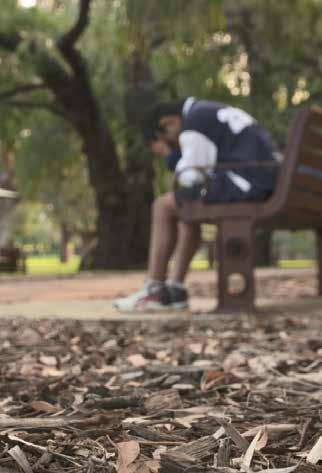
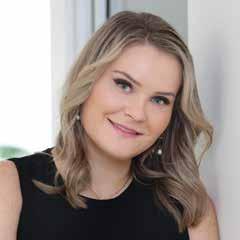
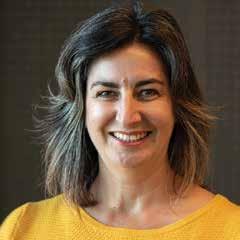
For more information please contact:
Sam Speirs E | Samantha.Speirs@telethonkids.org.au
P | (08 6319 1291

Prompted by the knowledge that mental health is just as important as physical health, Mineral Resources Limited (MinRes) last year launched their ‘Mind Matters’ series - regular events giving employees and families a chance to hear direct from experts on mental health topics.
The July event saw MinRes Corporate Psychologist and Head of Mental Health, Chris Harris, host more than 100 people at the WA Museum Boola Bardip to hear about research being undertaken by the Embrace team at Telethon Kids.
Youth mental health researcher Dr Nicole Hill was invited as a guest speaker to discuss a new research program – Community Strengths in Suicide Prevention Project, which is using data to identify mental health ‘hotspots’ in WA.
We thank MinRes, whose ongoing support as Principal Partner of this project, is enabling this lifesaving research to happen. It is great to see our corporate partners having these important conversations and inviting us to be involved and share our knowledge and research. It was a powerful evening, reminding us to share openly and regularly with our communities, colleagues, families, and friends.
We joined Mineral Resources for a coffee and a conversation on R U OK? Day. Embrace CoDirector at the Telethon Kids Institute, Professor Ashleigh Lin sat down with MinRes Corporate Psychologist & Head of Mental Health, Chris Harris, to discuss critical mental health research and highlight the importance of starting conversations with those around you.
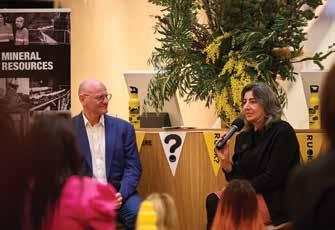
Outlining some of the strategies supported by Telethon Kids Institute research findings to assist parents in maintaining their kids’ mental health and wellbeing, Ashleigh spoke about the need for more youth mental health services, and how the team at MinRes can support their own mental health.
Take time for yourself: at such a busy time of the year, it’s important to allow yourself a moment of respite. Read a book, take a bath, pursue a creative project or watch a movie on the couch – do something that is just for you
The work of EMBRACE is proudly supported by principal partner Rio Tinto.
Spend time with your loved ones: just as important as time to ourselves is time spent in the company of our friends and families. Few things recharge our batteries like a genuine interaction between people with shared compassion
If you think that extra support could be helpful for you, remember that seeking help is a strength and not a weakness: whether you talk to a friend, family member, or a professional, you should feel proud that you are taking the initiative to care for yourself
Working with our community is integral to the success of our research. How we research can be as important as the research itself. Being guided by community every step of the way helps ensure the research genuinely does make a difference.
The Telethon Kids Institute's Guidelines for the Standards for the Conduct of Aboriginal Health Research (The Aboriginal Research Standards) were launched in July 2022, during NAIDOC week. This year the theme was Get Up, Stand Up, Show Up.
The Aboriginal Research Standards outline how the Institute works together with Aboriginal people at each stage of a research project, recognising that our research can only truly make a difference when we have genuine partnerships with Aboriginal communities.
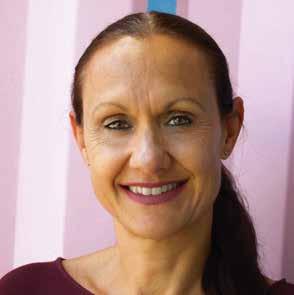
Developed to deepen understanding of working with Aboriginal communities, the Aboriginal Research Standards are aligned with best practice advice from the National Health and Medical Research Council (NHMRC), the Australian Institute of Aboriginal and Torres Strait Islander Studies (AIATSIS) and Ethics Committees.
The Institute uses a strengths-based approach to working with Aboriginal and Torres Strait Islander Peoples and communities. This means understanding that people and communities have lived experiences that give knowledge and insights into addressing health and other issues in community(ies). The Standards ensure that Aboriginal ways of knowing, being and doing are embedded in research.
The research teams at Telethon Kids are encouraged to work in collaboration with the Kulunga Aboriginal Unit, Aboriginal community engagement or liaise with specialist team members to leverage these strengths and capabilities in communities for their intended research projects.
For some researchers, the Aboriginal Standards will reinforce the way in which they are already doing research. For others, this will be a new way of approaching their work.
Cheryl Bridge, Head of the Kulunga Aboriginal Unit, acknowledges that the Aboriginal Research Standards are aimed at researchers but notes that at the Institute, Aboriginal health is everyone’s business.
“Aboriginal health is everyone’s business, so that means the standards are everyone’s business. It doesn’t matter whether people do research within the Aboriginal space or not, Aboriginal people are part of everyday life in Australia and people need to be across the standards,” Cheryl said.
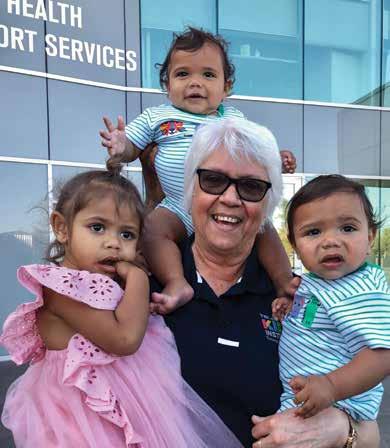
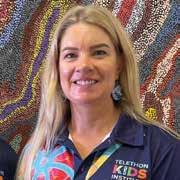
Healthy Skin and Acute Rheumatic Fever Prevention Senior Research Officer Rebecca Famlonga is the inaugural recipient of the Supporting Training for Aboriginal Researchers & staff (STARS) Student Scholarship.
Rebecca is a proud Wadawurrung woman who is extremely passionate about inspiring other Aboriginal people to lead the way in Aboriginal research and to empower more of her mob to lead the change they want to see.
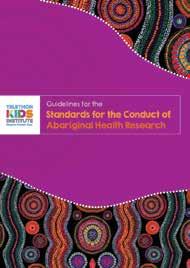
By embedding these standards within our everyday business at Telethon Kids Institute we hope to influence and encourage other organisations to take a similar path.
There are many researchers at the Institute already embedding the Aboriginal Research Standards within their projects and the ways they work with Aboriginal communities and peoples.
“Our history with research hasn’t always been positive. Now having community involved in our research and having a voice at the table, that two-way learning happens all the time. Aboriginal communities and families are knowing now what research really is, why it’s important and how it can be helpful and they’re really happy to be part of that now, whereas in the past it wasn’t always like that.”
-Val Swift, Djaalinj Waakinj Aboriginal ear health program
Special thanks and acknowledgement go to everyone who has been involved in the development of the Aboriginal Research Standards, including our Elder Co-Researchers, the Development and Implementation Working Groups, the Kulunga team and the Aboriginal staff.
Committed to research excellence, her work at Telethon Kids is embedded within the SToP trial, a research project of the Healthy Skin and Acute Rheumatic Fever (ARF) prevention team within the END Rheumatic Heart Disease (RHD) program. This work aims to empower the community to take the lead in skin health following the completion of the SToP trial, and will involve community consultation and engagement to explore the community's vision of their future story of skin health.
Rebecca said the funds awarded from the STARS Scholarship would enable her to complete her Kimberley-based community consultation Master's thesis –which will have an influence on the development of any future research based on working with communities to end RHD in the future.
"Being awarded the STARS scholarship will afford me more time for my research, allow me to engage more regularly with my Perth-based supervisors, and acknowledge community members for sharing their knowledge and expertise with me," Rebecca said.
The STARS Student Scholarship Program was launched in 2021 as part of the Institute’s Commitment to Aboriginal children and families. The program’s founding donors, renowned researchers Clinical Associate Professor Deborah Lehmann AO and Professor Michael Alpers AO, spent their careers as champions for Indigenous health.
STARS is supported through our donor community. If you’re interested in learning more about the STARS program or would like to support training opportunities, please get in touch with Patrice Maher on 6319 1102, or email patrice.maher@telethonkids.org.au

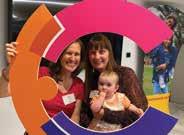
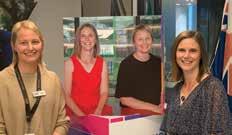


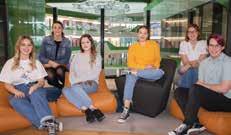
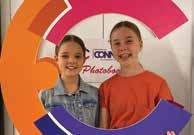
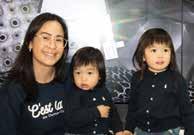
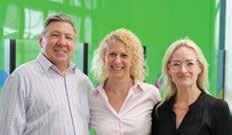
At Telethon Kids Institute, our community plays an important role in what we do, how we do it, and what we achieve. Together we have made a difference and can continue to do so.
Telethon Kids CONNECT honours the many ways that our community supports us to make our research great and to help us achieve our vision of happy healthy kids.
For almost two decades our community has supported, embraced, and been actively engaged in our work. Through collaboration with our community, we have created one of Australia’s largest and most well-developed community engagement programs contributing to health research. As a community working together, there is a lot to be proud of and to celebrate.
CONNECT strengthens our partnership with community. We invite you to join us and there are many ways you can (and you are not limited to one!):
Involvement

• By being involved in shaping decisions and working closely with our researchers
• Taking part in research
• Participating in a project, study, or trial that you are passionate about Fundraising
• Fundraising in creative ways to support our research
• Volunteering your skills, expertise, and time Advocacy
• Advocating with us to bring about change to policy and practice
Information sharing
• Helping to spread the word about research and results in ways the community understands
CONNECT with us today.
To find out more and join online, scan the QR code or visit telethonkids.org.au/connect
Philanthropy is the activity of supporting the welfare and wellbeing of others, often generously expressed in the form of money. Every financial gift – whether it is unconditional or directed to an area of research close to your heart –empowers our researchers to ask big questions and moves us closer to new discoveries that help kids.
You may have already read about some of our superstar community fundraisers within this edition of Together.
There are so many ways to be involved and every dollar counts. Whether it’s holding a fundraising event, joining our Hopscotch donor circle by making a personal donation, taking on a physical challenge, getting your school or workplace involved, or including a gift to Telethon Kids in your Will, every dollar raised goes straight to supporting research and has a big impact.
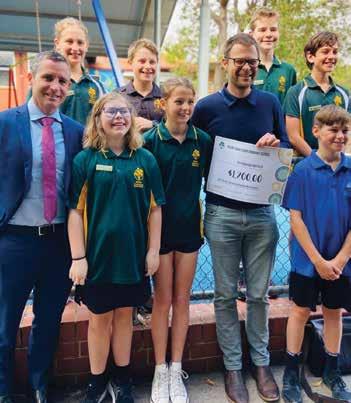
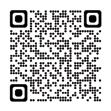
To learn more, scan the QR code or visit giving.telethonkids.org.au

Bradley, Richard’s son, passed away when he was just six years old from medulloblastoma – an aggressive form of brain cancer. In memory of Bradley, Richard decided to do something brave for his 80th birthday – he jumped out of a plane over Jurien Bay to raise money for brain cancer research at Telethon Kids Institute.
With the support of his friends, family and the generous community, Richard raised more than $30,000 for the Telethon Kids Cancer Centre!
The sky’s the limit for the Telethon Kids Institute when we have the support of fundraisers like Richard who go the extra mile (or 14,000 feet!) to support the work of our world-class researchers.
A special thank you to Richard, his wife Sue and family for their support of the life-changing cancer research underway at Telethon Kids Institute.
We would love for you to join our giving community.
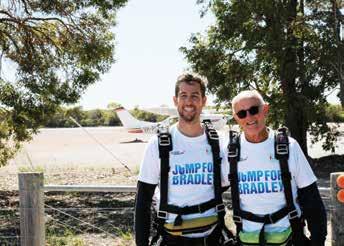
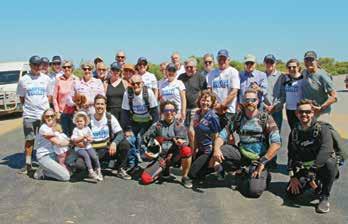
There are many reasons to participate in research – from playing an active role in understanding your own health and wellbeing, to sharing your own experiences to benefit others, helping to develop services and treatments, and having a sense of giving back or contributing to the greater good. We all have different reasons ‘why’ we might choose to participate in a research study or trial.
For CONNECT Member Neil, it was his desire to better understand Foetal Alcohol Spectrum Disorder (FASD) that led him to participate in research in this area.
“I started out attending a couple of talks/presentations and then began as a community member and as part of the steering committee on the Banksia Hill Project. Being able to be involved in that research, and the ability to share that with families, gives me so much satisfaction and is what motivates me to be involved and hopefully continue to contribute.”
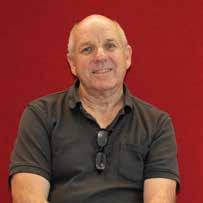
At Telethon Kids Institute, we always have new and exciting research projects for community members to take part in. See what research participation opportunities are currently available by scanning the code. If you are interested in a specific area that isn’t currently listed, contact our team to register your interest for upcoming projectsconnect@telethonkids.org.au

We are in the process of designing and developing an action-packed calendar of events for 2023. From CONNECT welcome events to being part of our Hopscotch community, bespoke philanthropy sundowners, hearing from international researchers and fundraising opportunities – there will be something for everyone. Stay tuned to our Supporter Update newsletter for additional details.
We look forward to connecting with you in the new year.
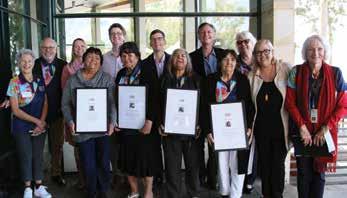
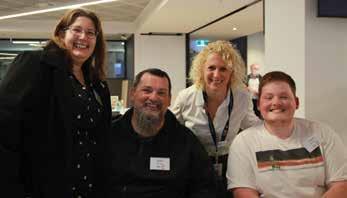
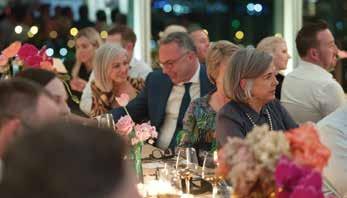
We’re on the hunt for new volunteers to support our education and outreach activities at the Telethon Kids Institute Discovery Centre in 2023!
If you’re passionate about science and research, love playing with kids and can give up a minimum of two hours a fortnight, this could be the opportunity for you.
The Telethon Kids Discovery Centre is an interactive play space at Perth Children’s Hospital, full of games to help kids understand science and medical research.
Volunteers not only help run the Centre, but they also help us run primary school excursion programs and take activities out to kids waiting for hospital appointments.
As a volunteer you might find yourself helping kids extract DNA from strawberries one day and then making mucus slime the next – no two days are the same!
Caitlin Wilson has been a volunteer in the Discovery Centre since 2020. As a university student studying science, Caitlin finds volunteering very rewarding, as she gets to put what she’s learning at university into practice.
“I’ve been volunteering in the Centre for a couple of years now and find it really rewarding to chat to kids and families about science. My favourite part is when I get to spark kids’ interest in the research that’s occurring at the Institute and explain how it could benefit the kids and their friends.”
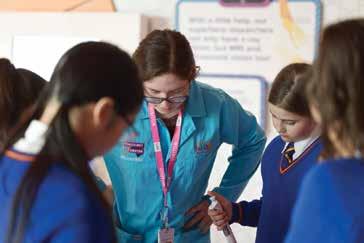
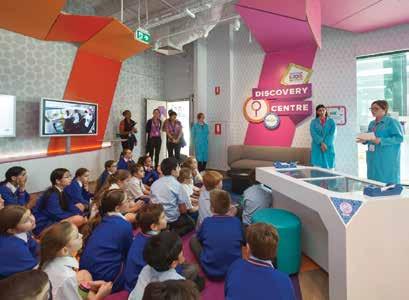
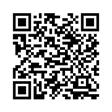
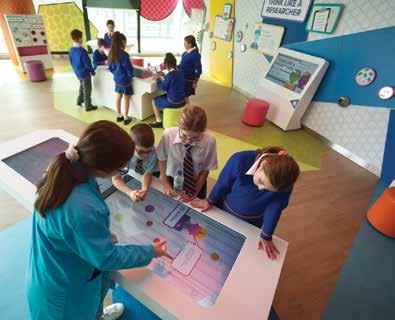

Think of all the inspirational changes in medicine you’ve seen happen from when you were a kid to today. Medical research has transformed the course of so many diseases that used to plague childhood. What we do today in medical research will change the lives of generations to come. At Telethon Kids Institute, generous supporters are helping to secure that future by leaving a gift in their Will.
“I know my gift to Telethon Kids Institute will have far-reaching impact for kids in Australia and all around the world. Ensuring our kids have a great foundation in life is something I happily contribute to both now as a donor and in my Will.”
- Anne Last, former staffer and Fiona Stanley Circle member
Everyone who includes a gift to Telethon Kids Institute in their Will is welcomed into our Fiona Stanley Circle. The Circle is named in honour of one of Telethon Kids’ most treasured benefactors: Founding Director and now Patron Professor Fiona Stanley AC. A ground-breaking epidemiologist, Fiona has devoted her life to championing children’s health. Her passion for discovering innovative ways to help kids was the spark that created Telethon Kids Institute and continues to be the beating heart of our work.
A Will is your way of making sure loved ones know your intentions. Recently Telethon Kids held a Wills writing workshop for staff to learn about why having a Will is important. Hearing from expert Steven Brown from Lynn & Brown Lawyers, staff learned that having your wishes legally recognised not only provides clarity for families and loved ones during a time of grieving, but it can also have significant financial benefits.
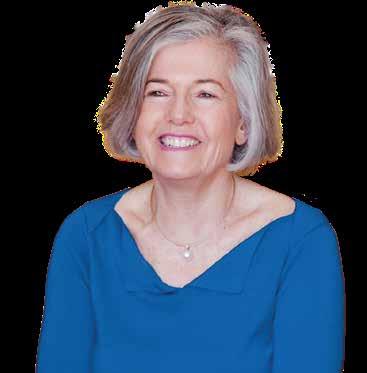

Every adult over age 18 should have a Will, Enduring Power of Guardianship, and Advanced Health Directive
There are many legal nuances, so engaging a lawyer ensures your Will is legal and binding, correctly details your wishes, and is tailored to your situation
It is good practice to review your Will every 3-5 years at a minimum
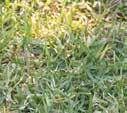
Including a gift in your Will can both support causes you care about and reduce tax paid by your beneficiaries
Following on from the success of the internal workshop, we’ll be offering the chance for our supporters and community members to attend a future Wills writing workshop.
Stay tuned to our upcoming Supporter e-newsletters for more details.
Create happy, healthy futures for generations of kids with a gift in your Will. For more information, please contact: Development Manager, Community Giving Erin Hurson T | +61 8 6319 1444 E | erin.hurson@telethonkids.org.au
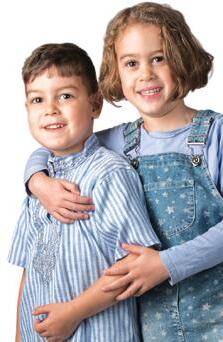 Anne Last
Anne Last
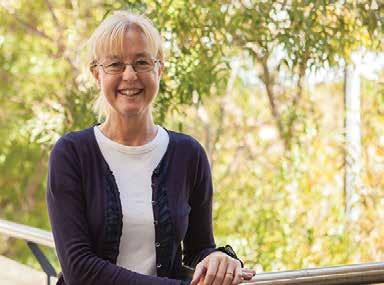
For the parents of the more than 5000 Australian children born each year who are diagnosed with an intellectual disability, life can be filled with great joy but also with significant challenges.
Telethon Kids researchers work with families to find ways to support and have a positive impact on these children’s lives.
In 2020, research led by Associate Professor Jenny Downs, Head of the Development and Disability Program at Telethon Kids, showed that a procedure known as gastrostomy – where a feeding tube is placed into the stomach –can lead to better overall health in children
with intellectual disability and reduce the total number of hospitalisations they must endure. This improvement was possibly because the children were better nourished.
The research used linked data to follow the progress of hundreds of children from Western Australia and New South Wales who were born with intellectual disability between 1983 and 2010, and who were later given a feeding tube to support their nutritional requirements.
“This feeding tube which we call gastrostomy can mean better health and nutrition, opportunity for growth, more consistent and accurate delivery of medications, more independence in being able to feed away from home, and less frustration for children and families as a result of long and difficult feeding times,” Professor Downs said.
“The difference is a positive impact on general health, mental health and quality of life for both the children and their families.”
Understandably and despite the potential benefits – and even when feeding their child is stressful and time-consuming – the decision to opt for gastrostomy insertion can be difficult for parents. They need to learn a unique skillset, including methods of feeding and how to recognise and manage common problems, and to develop new routines and ways of living.
Now, thanks to the generosity of a bequest to the Institute, Jenny and her team have found a way to help families through the process of considering and then managing gastrostomy. Working in collaboration with Perth Children’s Hospital, Jenny and team have used funds from the bequest to develop an online resource known as Nourish.
Designed together with parents and clinicians from Perth Children’s Hospital, and with advice from other healthcare institutions around Australia, Nourish includes a series of videos and ‘Ask and Do’ exercises to support families in learning about gastrostomy.
Three modules cover a variety of topics and stages along the way: ‘Learn & Decide’, where parents share their experiences; ‘First

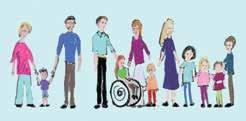


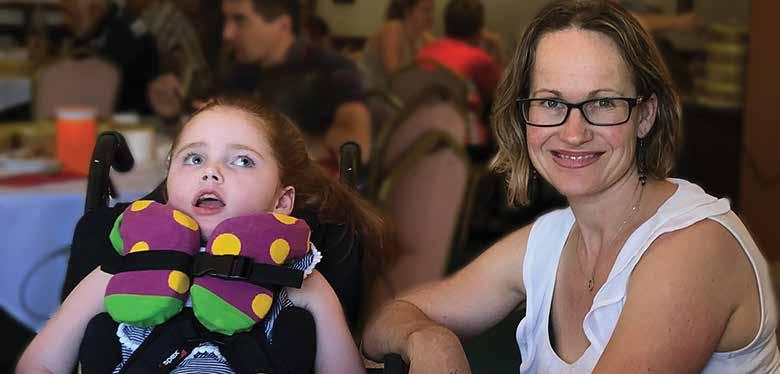
Steps in Hospital’, which offers insights into the gastrostomy procedure and what happens next; and, finally, ‘Living Well With Gastrostomy’.
Jenny said the online resource was the first of its kind – made by families and for families, with clinical support, and based on evidence from research led by Telethon Kids.
“Nourish is based on what parents told us that they needed to know. Parents need to learn new knowledge and skills, and at the same time build their confidence to manage their child’s feeding. Nourish is a free online resource and is being used across Australia and internationally by families whose child has complex medical needs and feeding difficulties,” Professor Downs said.
For children like Nina Davis, and mum Emma, the new resources and support have been life changing.
“Nourish helps families to make an informed choice as to whether a gastrostomy will be suitable for their child. It takes a three-pronged approach. It promotes awareness, it provides a full picture of the gastrostomy journey, and it shows practical steps and tips that make living with a gastrostomy easier. For our family, these are all important considerations because we want our child and our family to live well.
“Having the gastrostomy has been an absolute godsend, both for those practical sorts of reasons but also from the point of view of Nina’s best interests and health,” Emma said.
For more information and to access the Nourish with Gastrostomy resources, visit https://ddwa.org.au/online-learning-directory/nourish-course/
Special acknowledgment to Department of Communities for liaising on behalf of the anonymous family who have supported this work through their bequest.
Create happy, healthy futures for generations of kids with a gift in your Will.
For more information, please contact: Development Manager, Community Giving | Erin Hurson
T | +61 8 6319 1444
E | erin.hurson@telethonkids.org.au

Healthy skin is important for maintaining overall health and wellbeing. What is surprising is that some skin infections, if left untreated, can lead to more serious long-term health complications such as heart disease, kidney disease, or sepsis.
The Koolungar (children) Moorditj (good/solid/ strong) Healthy Skin Project is a study codesigned with Noongar Elders to investigate skin health and disease in urban-living Western Australian Aboriginal children and young people.
The Telethon Kids Institute’s Healthy Skin team has been working collaboratively with local communities in the Kimberley for a number of years to better understand skin health. This research has provided important information about skin health in remote communities and created strategies to help children and their families learn more about how to keep skin strong and healthy.

Derbarl Yerrigan Health Service
Whadjuk Boodjar (Perth) 98 Koolungar (children)
participated
Bernadette said the team had recently held skin screening community events which were extremely successful.
“Over 160 Koolungar and their families attended the events at DYHS and SWAMS during the Term 3 school holidays, where they had a skin health check by our team of doctors,” Dr Ricciardo said.
“Families were offered same-day treatment or follow-up visits in the monthly paediatric dermatology clinics, if required.” Bernadette said.

South West Aboriginal Medical Service
Wardandi Boodjar (Bunbury) 66 Koolungar (children) participated
Study participants received a healthy skin goodie bag to appreciate and acknowledge their time involved – a swimming bag including a hairbrush, donated skincare products, beautiful bush medicine body soaps handmade by Aunty Dale Tilbrook, and a pool entry voucher donated by local councils.
This project has been brought to life with support from the Channel 7 Telethon Trust and Wesfarmers Centre of Vaccines and Infectious Diseases.
While a lot of work has been done with remote communities, little is known about the prevalence of infectious (e.g. skin sores) and non-infectious (e.g. eczema) skin disease in urban Aboriginal children. So, our Telethon Kids team has partnered with local Aboriginal health services – the Derbarl Yerrigan Health Service (DYHS) and the South West Aboriginal Medical Service (SWAMS) – to learn more about skin health and disease in urban populations. The project will highlight treatment and prevention strategies.
The collaboration will ensure outcomes can be sustained beyond the project’s lifetime by focusing attention on the strengths of Aboriginal Community Controlled Health Organisations (ACCHO).
Noongar Elder co-researchers Uncle Noel Nannup and Aunty Dale Tilbrook provide ongoing cultural direction, leadership, and guidance for this project – as do the two Community Advisory Groups that have been established to inform decisions on the co-design, development, and implementation of the research on both Whadjuk (Perth) and Wardandi (Bunbury) boodjar (Country).
The Community Advisory Groups have also co-designed health promotion resources with the research team, with clinical input from dermatologist Dr Bernadette Ricciardo, who is undertaking the project as her PhD.
Over the two weeks of skin screening community events, the study’s Principal Investigators, Associate Professor Asha Bowen and Dr Ricciardo, led a multidisciplinary team of Aboriginal Health Practitioners, volunteer clinicians and research support officers.
The skin screening community events provided excellent opportunity to engage with community and talk about health promotion and skin disease prevention and management.
Special thanks go to our corporate and community supporters: Priceline, CeraVe, La Roche Posay, QV Skincare Australia, City of Stirling, City of Fremantle, South West Sports Centre, Reece’s Hire and Noongar Radio for their support and generous contributions to the screening events.

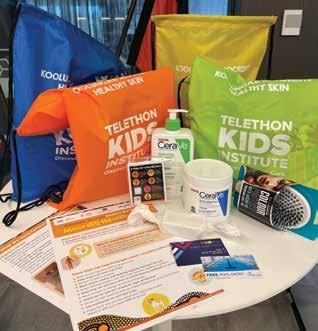
The pathway to happy, healthy kids, starts well before birth, and even before conception.
We know that pregnancy and the first few weeks of life is a particularly crucial time that can shape a baby’s health trajectory for life.
Our researchers are working on cutting-edge studies to unlock the science as to why some families experience the trauma of stillbirth and preterm birth – and the vital interventions that can set up our most vulnerable babies born too early, to not just survive, but thrive outside the womb.
Professor Tobi Kollmann joined the Institute in 2019 from Canada and is recognised as one of the world’s leading vaccinologists. His work focuses on deciphering how a mother’s immune system can help prevent stillbirths and dangerously preterm births.
Tobi is working within Australia, and around the world, on projects using feasible, proven-safe interventions like influenza, pertussis (whooping cough) and BCG (tuberculosis) vaccines or nutritional supplements to tackle this health crisis. Work in Kenya is trialling the use of a common food amino acid, L-Citrulline, to reduce neonatal sepsis in preterm babies. This simple, cheap, and scalable intervention could have significant translatable impact to mums and babies all over the world, particularly in low- to middle-income countries.
“The day you are born is also the day you are most likely to die from infection” Tobi warns. “The annual burden of newborn and maternal perinatal death rivals that of COVID since the beginning of the pandemic. Yet, safe and cheap interventions like nutritional supplements or maternal vaccinations can provide the key to powering the mother’s immune system in preventing many of preterm births and stillbirth. My work is focused on empowering mothers to ensure babies are born strong everywhere.”

In 2020 Shannon created PELICAN (Prematurity’s Effects on the Lungs in Children and Adults Network) which is a global network of researchers who are collecting data with the purpose of improving lifetime lung health outcomes for premature babies.
biKollmann
Despite our best research and treatments, we know some babies will continue to be born early. Properly supporting their acute and long-term care needs is critical to ensuring a healthier life.
Associate Professor Shannon Simpson, CoHead of the Institute’s Lung Health team, is working to understand lung health trajectories in very preterm babies – and ultimately find interventions to correct those on the pathway to poor outcomes.
Medical research in the last 30 years has led to a huge rise in the survival rates of preterm neonates.
In the early 1990s, babies born before 32 weeks had very high mortality rates, yet today, 85 per cent of babies born from 22 weeks’ gestation survive. However, the lungs are one of the last organs to develop in utero, and research published by Shannon and her peers have shown that preterm babies’ lung health doesn’t catch up once outside the womb. In fact, it often worsens throughout childhood and as they become adults.
“Preterm newborns in Perth have access to some of the best care and most knowledgeable clinicians and researchers in the world. Yet, once they leave NICU (Neonatal Intensive Care Unit), there’s traditionally been very little follow up regarding their lung health – which may never catch up to their full-term peers. Our work through Telethon Kids Institute has established world-leading research that tracks and follows a significant cohort of kids born prematurely. We’re monitoring them from infancy to adulthood to determine lung health trajectories and find the best interventions for chronic lung disease in this population.”
Other Institute world-class researchers working with our littlest patients include Professor Jane Pillow, who leads the CIRCA DIEM trial that works with premature babies in NICU using eye masks and ear plugs to establish circadian rhythms that are crucial for good growth and development.
Clinical Professor Tobias Strunk’s COSI-2 trial uses coconut oil on very premature NICU babies to combat sepsis and infection, as well as helping kids with eczema or those undergoing chemo.
Read more about their incredible work in the 2022 Annual Impact Report on our website (www.telethonkids.org.au/ about-us/annual-reports).

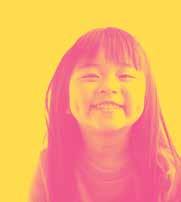
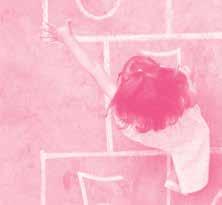
Our Hopscotch supporters, who donate $500 or more a year, recently attended an event at the Institute to hear from Professor Tobi Kollmann and Associate Professor Shannon Simpson about their vital work in maternal and infant health.
Guests heard from Tobi, Shannon, and Executive Director Jonathan Carapetis and learned about the world-leading research being conducted out of Perth to help very premature babies.
2 3 4 5 6 7 8 9 10
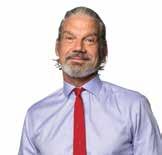
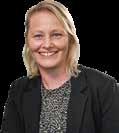
To hear from researchers like Tobi and Shannon, join our Hopscotch community for 2023! To learn more or make a Hopscotch gift, visit giving.telethonkids.org.au or contact hopscotch@telethonkids.org.au

With an international profile in school health promotion intervention research, Professor Donna Cross is a renowned campaigner for the wellbeing of children and young people, with a focus on mental health and social-emotional wellbeing.
Donna is one of the world’s leading researchers seeking to understand ways to help young people navigate a path to an adult life free from the social and emotional traumas that are all too common.
Her scholarly contribution to children’s health research has been recognised by many university, state, and national awards. For her leadership in improving children’s and adolescents’ mental health and wellbeing, Donna has received an OAM, was the 2012 WA Australian of the Year and the 2022 inductee to the WA Women’s Hall of Fame, and she is a Fellow of the Australian Academy of Health and Medical Science.
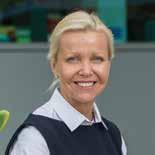

A big congratulations to Professor Britta Regli-von Ungern-Sternberg, who has been awarded the top prize – overall Tall Poppy – at the 2022 WA Tall Poppy Science Awards.
Britta – who has created one of the largest paediatric anaesthesia research groups globally – is Co-Program Lead, Perioperative Care and Leader of the Perioperative Medicine Team at Telethon Kids Institute, the Chair of Paediatric Anaesthesia at The University of Western Australia, and a specialist paediatric anaesthetist at Perth Children’s Hospital.

Together with her multi-disciplinary team, she has generated knowledge that has led to significant changes in routine clinical practice globally and, consequently, a reduction in complications and improvement of outcomes among children undergoing anaesthesia.
But perhaps her biggest achievement comes down to one of the simplest of things of all – human connection.
After joining us in 2014, we were sad to see her retire earlier this year. As an Institute, we shared our thanks for her commitment, dedication, and passion. Donna is sorely missed at Telethon Kids but her influence will always remain at the heart of what we do.
Donna is off to pursue some exciting ‘retirement’ plans, including volunteering with child-focused organisations, mentoring, and putting her dancing shoes on to learn to tango!
Four PhD students from Telethon Kids Institute, Curtin University and The University of Western Australia were named recipients of the inaugural Stan & Jean Perron PhD Career Launching Award.
Congratulations to Mohammed Junaid, Simone Mahfouda, Gladymar Perez and Alanna Sincovich, who will receive $20,000 in funding to support the completion of their PhD and transition to postdoctorate life.
A big thanks to the generous ongoing support from the Stan Perron Charitable Foundation, which is enabling our developing young researchers to build successful independent research careers.
Watch this space for big things in the future from these four!
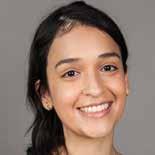

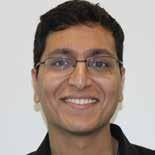
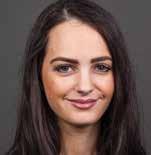
Britta’s main aim is to ensure that if a child needs a vital operation this is as safe and comfortable as possible.
What an outstanding achievement!
An innovative study will look at the challenges faced by new fathers, thanks to support from HBF. The study is part of The ORIGINS Project, a collaboration between Telethon Kids Institute and Joondalup Health Campus, that is following 10,000 children and their families.
The inaugural partnership between HBF and Telethon Kids will allow the ORIGINS team to study the challenges to mental and physical health fathers face during their transition to parenthood, and the impacts these have on the well-being of partners as well as the growth and development of their children.
Professor Bu Yeap, a professor in the Medical School at The University of Western Australia and a consultant endocrinologist, is leading the Flourishing in Fatherhood project alongside Professor Desiree Silva, Co-Director of The ORIGINS Project.
Previous research with 498 expectant or new ORIGINS fathers or partners found that one in 10 fathers experience depression and/or anxiety before or soon after birth, and one in five report feeling totally isolated in the first year of fatherhood.

“There has been a number of studies that have shown that fathers provide important influences on child development in ways that are unique and independent to those of mothers,” Bu said.
“However, there is little research into the health of expectant fathers, their post-natal health trajectories, and the impacts of this on fathering and children. Understandably, existing research has often focused on the birthing mother. Therefore, the Flourishing in Fatherhood project will address an important gap in knowledge.”
“The generous funding from HBF through its Community Partnerships program is allowing ORIGINS to build on this previous research, providing support and interventions at this vulnerable time in a father or partner’s life,” Desiree added.
At Telethon Kids, our employees have the option to give back. Over the past four years, staff involved in our workplace giving program – Peers & Partners – have collectively raised nearly $130,000. Each year their gift is matched by Leadership to support many worthy projects, including research project seed grants, student scholarships, capacity building for Aboriginal staff and students, collaboration grants, and employee wellbeing.
This means each year our own staff make a significant contribution to what inspires them to get up every morning – excellence in child health research.
You too can give to Telethon Kids Institute through workplace giving. Workplace giving is a simple way for you to support a cause by contributing a small portion of your salary pre-tax to a selected charity. It encourages an enriched company culture, inspiring colleagues with a shared passion.
The workplace giving program at Telethon Kids Institute is a fantastic way to engage staff through regular giving and contribute towards ensuring all kids have a happy, healthy childhood.
Collaboration between Telethon Kids Institute and workplace giving partners provides bespoke opportunities to be involved behind the scenes and part of our supporter community.
RemSense became a Workplace Giving Partner earlier this year after visiting Telethon Kids Institute, wishing to engage their staff and give back to the community.
The technology company has developed a unique online platform to help support something we all have in common – remotely accessing, visualising, and interacting with assets that help clients solve the trickiest problems.
When the topic of engaging audiences in a COVID world with strict limitations was raised, RemSense put forward a solution to our problem – a photogrammetry digital twin model of our laboratories.
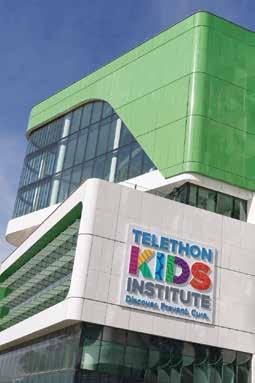
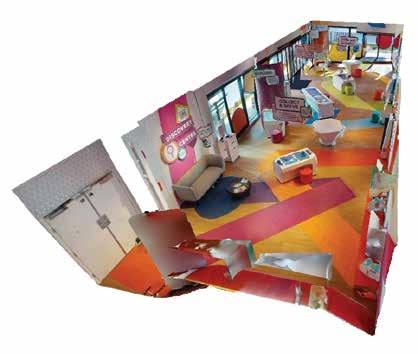
As a growing research institute, we are constantly collaborating and partnering with researchers across the globe. Our workplace giving partnership with RemSense has virtually opened our doors to so many new opportunities, thanks to their ongoing support and generosity.
“Workplace giving is important for us. It’s part of our social responsibility package that encourages our staff and the business to engage with the community. It’s a very simple way for everybody to be able to contribute,” Steve Brown, Managing Director and CEO of RemSense said.
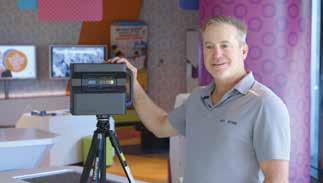
Bring your students to the Telethon Kids Institute in 2023 and see what a science lab looks like, meet some real-life scientists and learn about the importance of health and medical research!
The Telethon Kids Institute Schools Programs aims to get students excited about science and medical research. Bookings are now open for incursions and excursions in 2023.
Telethon Kids Excursions run for two hours and take place in our head office based at Perth Children’s Hospital. They include a hands-on workshop, tour of our labs and exclusive time in our Discovery Centre. Cost = $7 per student + GST Topics:
• Get a Lung of This • Years 3-4
• How Sweet It Is (diabetes and sugar) •Years 3-6
• Delicious DNA • Years 5-6
• Microscopic World • Years 5-6
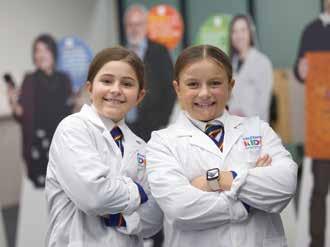
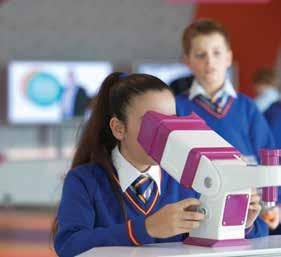
New for 2023, we are now offering hands-on workshops as school incursions. Taking place at your school, these will include a workshop run by a real-life Telethon Kids scientist with topics related to health and medical research. We can visit up to 2 classes per incursion. Cost = $5 per student + GST
Topics:
• Poo and You • Years 1-2
• Get a Lung of This • Years 3-4
• Germs • Years 3-6
• How Sweet It Is (diabetes and sugar) • Years 3-6
Invite a health and medical researcher into your classroom this National Science Week and learn about what a career in science looks like. These presentations include a fun hands-on activity with your students. We can visit up to two classes per incursion. Cost = $120 flat rate + GST
We have scholarships available for schools with an ICSEA score below 1000
Scan the QR code to find out more or make a booking on our website.
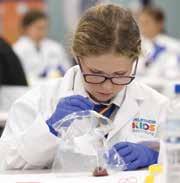
If you have any questions, check out our Frequently Asked Questions (FAQs) on our website or reach out to the Outreach & Education team at schools@telethonkids.org.au
Northern Entrance, Perth Children’s Hospital 15 Hospital Avenue, Nedlands WA 6009 PO Box 855, West Perth Western Australia 6872
T | 08 6319 1000
E | contact@telethonkids.org.au
W | telethonkids.org.au
PRINCIPAL PARTNER